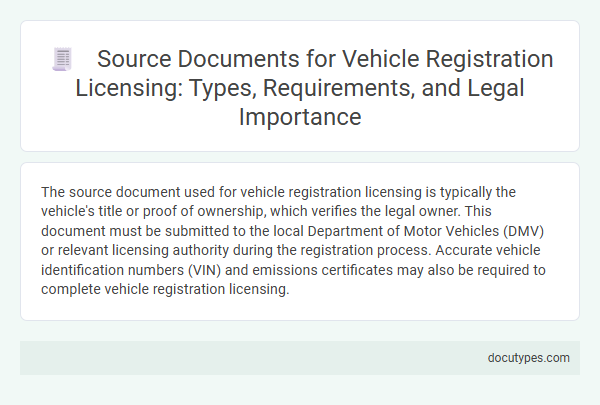The source document used for vehicle registration licensing is typically the vehicle's title or proof of ownership, which verifies the legal owner. This document must be submitted to the local Department of Motor Vehicles (DMV) or relevant licensing authority during the registration process. Accurate vehicle identification numbers (VIN) and emissions certificates may also be required to complete vehicle registration licensing.
Introduction to Vehicle Registration Licensing
Vehicle registration licensing is a mandatory process that confirms the legal authorization for a vehicle to be operated on public roads. This procedure ensures that the vehicle meets safety and environmental standards set by regulatory authorities.
The primary source document used for vehicle registration licensing is the vehicle's title or proof of ownership. This document verifies the owner's legal rights and contains essential information such as the vehicle identification number (VIN), make, model, and year.
Understanding Source Documents for Vehicle Registration
Source documents for vehicle registration licensing include the vehicle title, bill of sale, and proof of insurance. These documents verify ownership, transaction history, and compliance with legal requirements. Understanding these essential papers ensures a smooth registration process for your vehicle.
Types of Source Documents Required
Vehicle registration licensing requires specific source documents to verify ownership and identity. Commonly accepted documents include the vehicle title, bill of sale, and proof of insurance.
Other essential documents might include a valid driver's license, emission test certificates, and proof of residency. These documents ensure compliance with local and state regulations during the registration process.
Proof of Identity and Address Documentation
| Source Document | Purpose | Details |
|---|---|---|
| Government-Issued Identity Card | Proof of Identity | Includes national ID cards, state IDs, or passports confirming legal identity and date of birth |
| Driver's License | Proof of Identity | Valid driver's license issued by relevant authorities serves both identity and driving eligibility verification |
| Utility Bill | Proof of Address | Recent utility bills (electricity, water, gas) displaying the applicant's name and residential address |
| Bank Statement | Proof of Address | Official bank statements issued within the last three months containing applicant's name and address |
| Lease or Rental Agreement | Proof of Address | Signed lease or rental contract indicating current residential address |
| Vehicle Title or Previous Registration Document | Proof of Ownership | Shows prior ownership details required to register new or transferred vehicle |
Vehicle Ownership and Purchase Records
The primary source document used for vehicle registration licensing is the vehicle ownership title or certificate. This document provides legal proof of ownership, which is essential for the registration process.
Purchase records, such as a bill of sale or purchase agreement, also play a critical role in vehicle registration licensing. These records verify the transaction between the buyer and seller, ensuring the ownership transfer is legitimate. Authorities require these documents to confirm that the vehicle complies with legal requirements before issuing a registration license.
Emission and Roadworthiness Certificates
What source document is required for vehicle registration licensing regarding emissions and roadworthiness?
The primary documents used are the Emission Certificate and the Roadworthiness Certificate, which verify that the vehicle meets environmental and safety standards. These certificates ensure compliance with regulations before the vehicle can be legally registered and operated on public roads.
Insurance Documents for Vehicle Licensing
The primary source document used for vehicle registration licensing is the insurance document, which proves your vehicle is legally insured. Insurance documents typically include details such as policy number, insured vehicle information, and coverage dates. These documents are essential for completing the vehicle registration process and ensuring compliance with state regulations.
Specific Requirements for Commercial and Private Vehicles
The source document required for vehicle registration licensing varies based on the type of vehicle and its intended use. Commercial and private vehicles have distinct documentation criteria to comply with regulatory standards.
- Commercial Vehicles - Must submit a valid commercial vehicle title and proof of insurance specific to commercial operations.
- Private Vehicles - Require the original vehicle title or manufacturer's certificate of origin along with standard insurance documentation.
- Additional Requirements - Both vehicle types need a completed application form and proof of identity from the vehicle owner.
These source documents ensure proper vehicle registration aligned with usage and legal compliance.
Legal Importance of Accurate Documentation
The primary source document used for vehicle registration licensing is the vehicle title or manufacturer's certificate of origin, which legally proves ownership. Accurate documentation is essential to ensure compliance with registration laws and avoid legal disputes.
- Vehicle Title or Manufacturer's Certificate of Origin - This document establishes legal ownership required for the registration process.
- Proof of Identity and Address - These documents verify the registrant's identity and residence, which are critical for lawful registration.
- Compliance with Legal Requirements - Maintaining accurate and complete records protects your rights and prevents penalties associated with fraudulent or incorrect registration.
What Source Document Is Used for Vehicle Registration Licensing? Infographic

